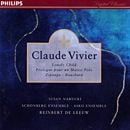Prologue pour un Marco Polo
(1981)Paul Chamberland and Claude Vivier (F-imaginary language)
5 voices: S,A,T,Bar,B; who additionally play 1 mouthpiece, 4 cardboard tubes, 1 BD, 1 Chin.gong, 1 Balinese gong, 1 artificial larynx.
Ensemble: 4cl-2bcl-perc(2):BD/tam-t/Balinese gong/Chinese gong/t.bells/brake drums/marimba/ant.cym; BD/tam-t/Balinese gong/Chinese gong/t.bells/rin gongs/marimba/SD-strings(4.3.3.2.1); tape
Abbreviations (PDF)
Boosey & Hawkes (Hendon Music)
Claude Vivier composed Prologue pour un Marco Polo on commission for Radio Canada Montreal.
Dedicated to Thérèse Desjardins, the work calls for a string orchestra of 13 instrumentalists, five clarinets and two percussionists, as well as five solo voices: soprano, alto, tenor, baritone and bass. The texts are Paul Chamberland and Claude Vivier.
The composer wrote the following analytical note on the work:
“A melancholy view of Marco Polo’s tragedy and above all, a mediation on a state of being, that of seeker who is misunderstood, “Prologue pour un Marco Polo’ is all of this. A prologue to this mysterious Marco Polo says more about his inner life than about his voyages (...) Through the musical writing it also becomes a language that guide us toward another: an invented language, which is really that on the general incomprehension against which poor Marco had to struggle (...) As for the musical work, there is a slow development of a monodic moment toward an intervalize moment which then is harmonized, adding harmonic spectra to the intervalize structure which is also illuminated by harmonic spectra.”
The work is in seven parts:
1. Discovery if the word Zipangu, which in Marco Polo’s time signified Japan.
2. Grand chorale and speech of the Sage who has partly understood Polo, but is also indifferent.
3. Call of Zipangu. Sadness, a land that glimpsed but never attained.
4. Grand chorale, which from a state of anarchy returns too a perfect homophony, all of this leading to the Magician’s solo. The structure is again untangled. This section ends in a last appeal from Zipangu.
5. Solo on the solitude of Marco Polo, preceded by an almost barbarian introduction. Solo superimposed on the amorouuuus supplication of the four voices. Slowly the music embroils all this and becomes the state of grace of solitary visionaries.
6. Clear and vertiginous visions of the shades of death and obliteration of the being.
7. Marco Polo today, a conversation but also fruits: he is not dead.
8. The testament of Marco Polo, a long solo always higher, the voice of God , almost the voice of madness.
— Claude Vivier
Reproduction Rights:
This program note may be reproduced free of charge in concert programs with a credit to the composer.

Schönberg Ensemble / ASKO Ensemble / Reinbert de Leeuw / Susan Narucki
Philips 454 231-2
Click here to purchase this album from Amazon.
